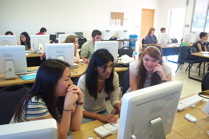An Undergraduate Summer Program
2010 NCAR, Boulder
2011 Columbia, New York
2012 UC Berkeley
| Statistics: The Science of Data |
|
Today, almost every aspect of our lives is "rendered"
in data. New data collection technologies have made it easy to record
continuous, high-resolution measurements of our physical
environment (weather patterns, seismic events,
the human genome).
We're also constantly monitoring
our movements through and interactions with
our physical surroundings (automobile and air traffic, large-scale
land use, advanced manufacturing facilities).
In computer-mediated settings, our activities either depend
crucially on or consist entirely of complex digital data (networked games,
peer-to-peer technologies, Web site and Internet usage).
The advent of these enormous repositories of information presents us with an interesting challenge: how can we represent and interpret such complex, abstract and often socially important data? |
| The Program | ||
The seven day workshop is designed so that students get
a sense of how statisticians approach large, complex problems.
Several different topics will be presented over the course of
the week. The topics may include
Importantly, students will also get a chance to work with
data. In the process, students will gain a basic
understaning of computing and visualization tools.
|
||
Our short program is designed to encourage students to attend graduate school in statistics. It is aimed at undergraduates who are rising juniors or seniors. |
| Join us! |
|
Students will receive support to cover travel expenses
to attend the workshop as well as full room and board.
Only US citizens and permanent residents
will be considered.

Applicants are expected to have some basic quantitative skills, including a background in calculus. An introductory course in probability and/or statistics is required. Quantitatively-inclined undergraduates majoring in engineering, computer science, physics, biology, mathematics, statistics and the behavioral or social sciences are all encouraged to apply. A minimum GPA of 3.0 is required. Women and underrepresented minorities are strongly encouraged to apply. |
This program is made possible by a grant from the National Science Foundation.

